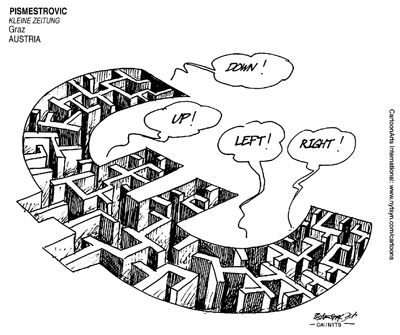
When it comes to inflicting pain on the citizens of debtor nations, austerians are all about steely determination — hey, it’s a tough world, and hard choices have to be made.
But when they or their friends come under criticism, suddenly the discussion is all about empathy and hurt feelings.
We saw that in the case of Olli Rehn, the vice president of the European Commission, whose friends at the commission were outraged, outraged when I pointed out, using slightly colorful language, that Mr. Rehn was repeating an often-debunked claim about economic history. And we saw it recently in Anders Aslund’s defense of the Harvard economists Carmen Reinhart and Kenneth Rogoff in the Financial Times against what he calls a “vicious” critique by economists at the University of Massachusetts, Amherst.
In an op-ed published earlier this month, Mr. Aslund, a Swedish economist, praised Ms. Reinhart and Mr. Rogoff “for providing an important corrective to the view that fiscal stimulus is always right — a position that is common across the Anglo-American economic commentariat, led by Paul Krugman in The New York Times.”
This is a curious thing for him to say because it’s an outright lie; as anyone who has been reading my work or that of the economists Martin Wolf, Brad DeLong, Simon Wren-Lewis and others knows, our case has always been that fiscal stimulus is justified only when you’re up against the zero lower bound on interest rates. I can’t believe that Mr. Aslund doesn’t know this; why, then, would he discredit himself by repeating an easily refuted falsehood?
But then, why would he describe the Amherst economists’ review as “vicious”? Their paper was a calm, reasoned analysis of how Reinhart-Rogoff came up with the famous 90 percent threshold; it seemed like a body blow to him only because of the contrast between the acclaim Reinhart-Rogoff received and the indefensible nature of their analysis.
What I think is happening is that austerians are finding they’re trapped in a box. They threw themselves — and their personal reputations — completely behind the various elements of anti-Keynesian doctrine: expansionary austerity, critical debt thresholds, and so on. And as the commentator Wolfgang Münchau says, the terrible thing was that their policy ideas were actually implemented, with disastrous results; on top of which their intellectual heroes have turned out to have feet of clay, or maybe Silly Putty.
As I see it, the sheer enormity of their error makes it impossible for them to respond to criticism in any reasonable way.
They have to lash out any way they can, whether with ad hominem attacks on the critics or with bitter complaints about bad manners.
And by such pettiness the world is governed.
Join us in defending the truth before it’s too late
The future of independent journalism is uncertain, and the consequences of losing it are too grave to ignore. To ensure Truthout remains safe, strong, and free, we need to raise $50,000 in the next 9 days. Every dollar raised goes directly toward the costs of producing news you can trust.
Please give what you can — because by supporting us with a tax-deductible donation, you’re not just preserving a source of news, you’re helping to safeguard what’s left of our democracy.